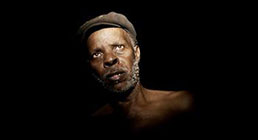|
|
|
|
Horse Money
|
 |
|
In Horse Money – for me, Pedro Costa’s best
film – much that was established in his previous work has purposefully disintegrated.
What few connections there initially were in the community he has faithfully
followed and depicted (initially gathered in Fontainhas, before being brutally
relocated) seem to have vanished altogether.
Of In Vanda’s Room (2000), Jeremy Carr
noted an “unorthodox solidarity” precariously assembling and loosely binding
these people, even as off-screen deaths and disappearances appeared to fly by
without any ceremony or ritualised memorialisation. In Colossal Youth (2006), we watch as the family model or unit slowly
frays and comes apart.
Now, in Horse Money, we pass over into the realm
of the ghostly, the spectral – it’s more like a Jacques Tourneur zombie movie
than even Costa’s black-and-white Blood/O Sangue (1989 [restored 2022]).
There is
literally less touch, less contact, less sensuality: more than ever, Costa’s
cinema gives off a chill. Historical time has become a rubber-band, and
geographical or architectural space has become a labyrinthine miasma. Everybody
seems sick or dying, in the grip of one “nervous disease” or another. It is a
dream-film of the highest, uncanniest order.
Ventura
dutifully trundles off to his old place of work, a telephone factory; there,
even the telephone in his office that he speaks into does not work – it’s
literally disconnected. Others arrive in the shadowy, trashed, abandoned rooms
of this place, awaiting their salary from twenty years ago, or seeking (as Vitalina Varela does) the arrival of identity papers
that will give them at least precarious standing in this new land.
Much of the
action elsewhere in the film appears to happen in a psychiatric hospital (again
worthy of Tourneur or other Val Lewton productions: Isle of the Dead [1945], Bedlam [1946]), where military ghosts occupy cavernous elevators, and the chords of a
pipe organ echo into infinity (this long huis-clos section of Horse Money earlier
appeared, in another form, in the 2012 omnibus film Centro Histórico).
Above all, Horse Money inexorably travels toward –
as in David Lynch’s Twin Peaks: The
Return (2017) – a temporal short-circuit joining the world of now with the
upheaval and tumult of the Portugal’s Carnation Revolution of April 1974. Costa
says he wanted to show the terrible ambiguity and confusion of that moment in
history, not as the mythic liberation it was for people of his age and class,
but rather for someone like Ventura and his clan. Not understanding which side
was which, or what the benefit could possibly be for his socially disadvantaged
kind, Ventura plunges into a literal dark thicket of reversible acts of
survival and murder, self-defence and hysteria.
Nothing that
happens in this part (or any part) of Horse
Money is certain; everything is both lived and remembered as hallucination,
as fog, as denial. This reality is too tough to bear; it cannot be inhabited.
It can only be reconstructed in a dream, in a montage. That’s the sole place or
frame in which we can dwell, for a time, moving around the pieces and
customising them.
Note: This is
an excerpt from a longer, career-survey text on Pedro Costa, titled “Where You
Can Live”, written for the book Reframing Portuguese Cinema in the 21st Century,
edited by Daniel Ribas & Paulo Cunha (Agência da Curta Metragem, 2020).
MORE Costa: Où gît votre sourire enfoui? © Adrian Martin May 2019 |
![]()